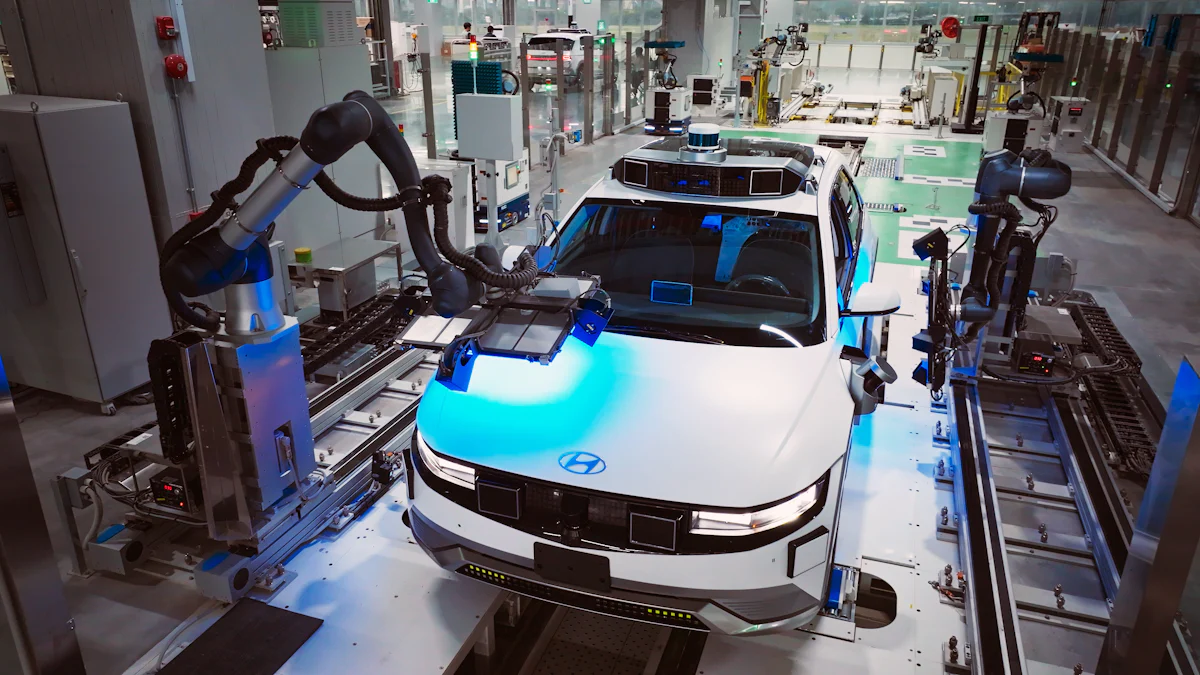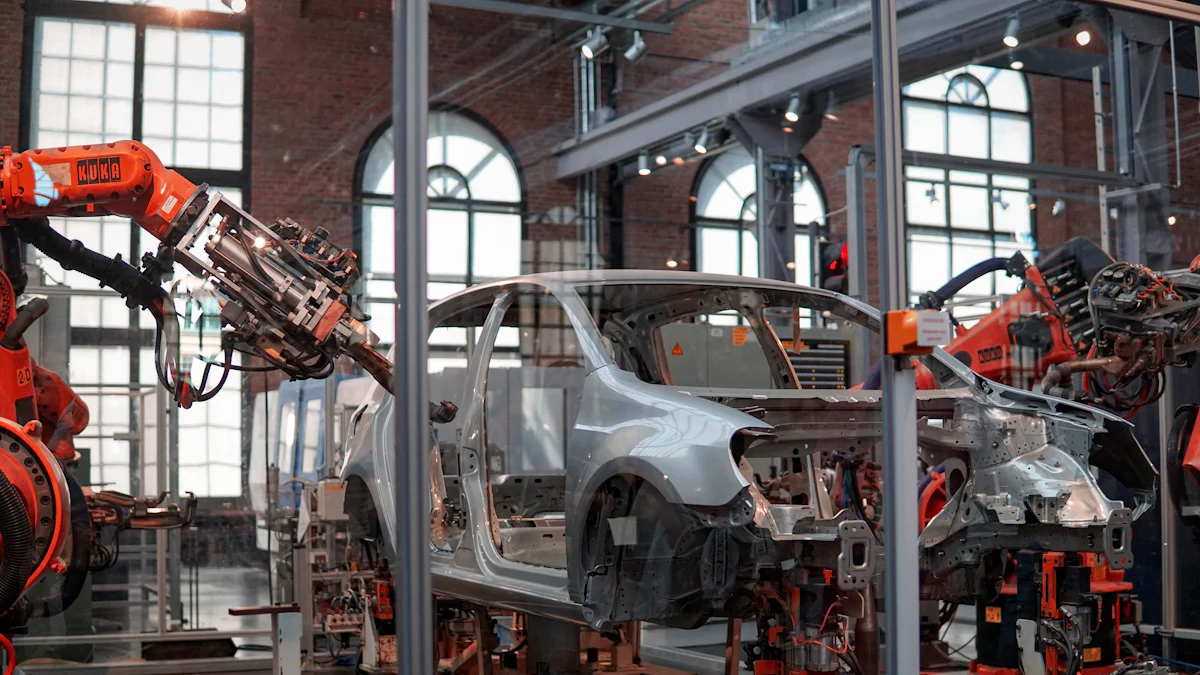Analyzing the Impact of U.S. Electric Vehicle Industry Policy on Global Supply Chains

The United States has implemented significant policies to boost the Electric Vehicle Industry. These policies have led to a 60% increase in EV sales, reaching 1.6 million units in 2023. Understanding the impact of these policies on global supply chains is crucial. The U.S. policies influence sourcing, manufacturing, and trade dynamics worldwide. Tesla, a major player, accounted for over 45% of battery-electric car sales in the U.S. by 2023. The shifts in supply chains affect economic and environmental aspects globally.
Overview of U.S. Electric Vehicle Industry Policy
Key Policies and Regulations
Federal Incentives and Subsidies
The United States government has implemented several federal incentives to support the Electric Vehicle Industry. These incentives aim to reduce the cost of electric vehicles for consumers. The Inflation Reduction Act (IRA) plays a significant role in this effort. The IRA offers substantial subsidies to promote domestic production and use of electric vehicles. The act excludes imported electric vehicles from these benefits. This exclusion encourages local manufacturing and strengthens the domestic Electric Vehicle Industry. The U.S. Treasury and Energy Departments have also released guidelines concerning foreign entities. These guidelines restrict the use of batteries and materials produced in certain countries. Such measures aim to secure the supply chain and enhance national security.
State-Level Initiatives
State governments in the U.S. have introduced various initiatives to bolster the Electric Vehicle Industry. States like California and New York offer additional incentives for electric vehicle purchases. These incentives include rebates, tax credits, and grants. State-level policies often focus on infrastructure development. Many states invest in charging stations to support the growing number of electric vehicles. States also collaborate with private companies to expand the charging network. Such initiatives aim to make electric vehicles more accessible to the public. State policies complement federal efforts by addressing regional needs and priorities.
Policy Goals and Objectives
Emission Reduction Targets
The U.S. Electric Vehicle Industry policy includes ambitious emission reduction targets. The government aims to cut greenhouse gas emissions significantly. Electric vehicles play a crucial role in achieving these targets. The transition from fossil fuel vehicles to electric vehicles reduces carbon emissions. The policy aligns with international climate agreements. The U.S. seeks to lead global efforts in combating climate change. The focus on electric vehicles supports a cleaner and more sustainable future. Emission reduction targets drive innovation within the Electric Vehicle Industry.
Market Penetration Goals
The U.S. government has set clear market penetration goals for the Electric Vehicle Industry. These goals aim to increase the share of electric vehicles in the overall automotive market. The government targets a substantial rise in electric vehicle sales by 2030. Achieving these goals requires collaboration between the public and private sectors. Automakers are investing heavily in electric vehicle technology. The government provides incentives to encourage consumer adoption. Market penetration goals reflect the commitment to transitioning to a sustainable transportation system. The Electric Vehicle Industry continues to evolve rapidly to meet these objectives.
Impact on Global Supply Chains

Supply Chain Dynamics
Raw Material Sourcing
The Electric Vehicle Industry has transformed raw material sourcing. U.S. policies encourage domestic investments in battery supply chains. This strategy reduces reliance on overseas suppliers. The focus on local resources aims to diversify supply chains. The U.S. collaborates with allies to limit exposure to human rights abuses. Environmental impacts also receive attention. The shift supports ambitious climate goals.
Manufacturing and Production Shifts
Manufacturing dynamics have shifted significantly. The Electric Vehicle Industry sees increased production within North America. Trade agreements like NAFTA and USMCA enhance supply chain integration. Investments in North American production receive incentives. European and U.S. carmakers adjust strategies to compete with Chinese manufacturers. Partnerships and investments emerge to strengthen market positions.
Price Scenarios and Economic Implications
Cost of Production
Cost structures in the Electric Vehicle Industry face changes. Domestic manufacturing investments influence production costs. Policies support "Buy America" requirements. These efforts benefit the U.S. economy and workforce. Reducing global supply chain vulnerabilities remains a priority. The focus on local production aims to stabilize costs.
Consumer Pricing Trends
Consumer pricing trends reflect policy impacts. The Electric Vehicle Industry experiences shifts in consumer prices. Incentives and subsidies affect affordability. The Clean Vehicle tax credit encourages local supply chains. Companies locate operations closer to home. This strategy influences pricing dynamics. The market adapts to new economic realities.
Policy Impacts on International Trade
Trade Relations and Agreements
Tariffs and Trade Barriers
The U.S. electric vehicle industry policy has introduced significant tariffs and trade barriers. These measures aim to protect domestic manufacturers from foreign competition. The Inflation Reduction Act (IRA) imposes restrictions on imported electric vehicles and components. This policy encourages local production but disrupts global supply chains. Many countries express concerns over these protectionist measures. Rising demand for electric vehicles amid tightening supply chains has pushed prices of battery materials to multi-year highs. The ongoing war in Ukraine has further exacerbated these challenges, pushing raw material prices to record highs.
Bilateral and Multilateral Agreements
Bilateral and multilateral agreements play a crucial role in shaping international trade dynamics. The U.S. collaborates with allies to secure supply chains and reduce dependency on specific countries. Trade agreements like the United States-Mexico-Canada Agreement (USMCA) enhance regional cooperation. These agreements facilitate the flow of goods and services between member countries. The focus remains on strengthening alliances and ensuring stable supply chains. However, the dominance of China in the EV battery supply chain raises concerns about vulnerability to geopolitical shocks.
Role of Key Players
Influence of Major Corporations
Major corporations hold significant influence over the electric vehicle supply chain. Companies like Tesla lead the market with innovative technologies and strategic investments. Tesla accounted for over 45% of battery-electric car sales in the U.S. by 2023. Automakers face challenges due to rising production costs and supply chain disruptions. The Biden administration's efforts to force electric vehicles onto the market have wide-ranging effects. Automakers are losing money on electric vehicle sales, leading to price increases for vehicles with strong consumer demand. These corporations drive technological advancements and shape market trends.
JUSDA's Role in Supply Chain Management
JUSDA plays a vital role in managing supply chains for the electric vehicle industry. The company specializes in logistics and supply chain solutions. JUSDA ensures efficient transportation and distribution of components and finished products. The focus on optimizing supply chain operations enhances competitiveness. JUSDA collaborates with various stakeholders to address challenges and improve efficiency. The company's expertise contributes to the stability and resilience of the global supply chain network.

JUSDA Solutions
To provide you with professional solutions and quotations.
Future Outlook and Projections
Technological Advancements
Innovations in Battery Technology
The Electric Vehicle Industry continues to innovate in battery technology. Researchers focus on increasing energy density and reducing costs. New materials like solid-state batteries promise longer ranges. These advancements aim to enhance vehicle performance. The United States anticipates a need for substantial lithium carbonate equivalent by 2032. This demand drives efforts to secure a stable supply chain.
Infrastructure Developments

Infrastructure plays a crucial role in the Electric Vehicle Industry. Expansion of charging networks supports increased EV adoption. Governments invest in public charging stations to meet demand. Private companies collaborate to develop fast-charging solutions. These efforts ensure convenient access for consumers. Infrastructure developments align with emission reduction goals.
Long-term Global Supply Chain Trends
Sustainability and Environmental Impact
Sustainability remains a priority for the Electric Vehicle Industry. Companies focus on ethical sourcing of raw materials. Efforts to trace supply chains improve transparency. Environmental concerns drive innovation in recycling technologies. The industry aims to minimize ecological footprints. Policies encourage sustainable practices across the supply chain.
Economic Growth and Market Expansion
The Electric Vehicle Industry contributes to economic growth. Increased demand for EVs stimulates job creation. Investments in manufacturing boost local economies. Market expansion offers opportunities for international trade. Automakers explore mining ventures to secure raw materials. These strategies support long-term industry stability.
The analysis of U.S. electric vehicle policies reveals significant impacts on global supply chains. Key findings highlight the importance of domestic production incentives and the challenges of securing ethical raw material sourcing. Stakeholders must consider the implications for trade relations and technological advancements. The need for traceable and sustainable supply chains remains critical. For further exploration, stakeholders should examine emerging partnerships in the EV battery supply chain. Monitoring legislative developments can provide insights into future industry trends. Engaging with these dynamics will help stakeholders navigate the evolving landscape of the electric vehicle market.
See Also
Unlocking Your Automotive Supply Chain's Full Potential
The Significance of Supply Chains in Global Trade
Delving into Jusda Supply Chains and Global Customer Needs
A Comprehensive Handbook on Eco-Friendly Supply Chain Transport
Diving into Robotics: The Evolution of Supply Chain Technology
